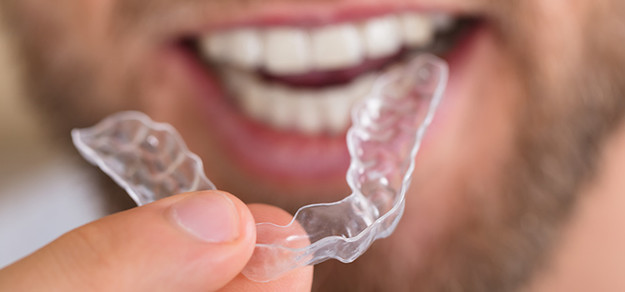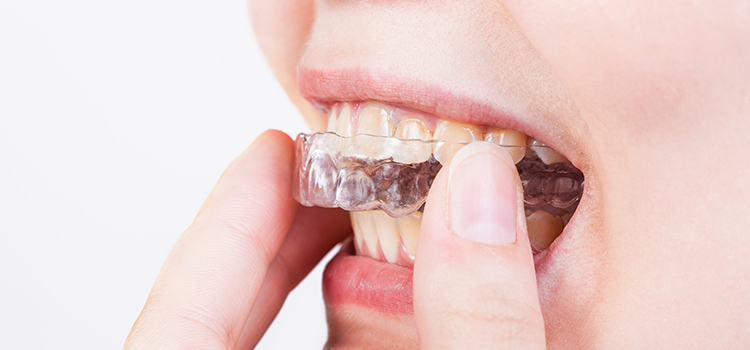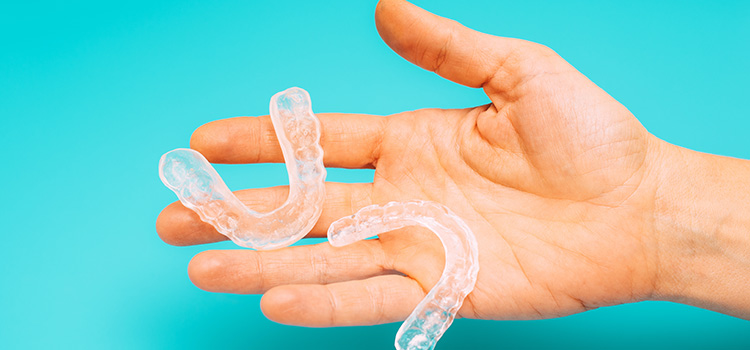Why is my Night Guard Falling Out?
9th Jan 2021

You faithfully put your night guard in every night before bed, and by morning, it’s missing from your mouth. What’s happening? Why is your night guard falling out? Rest assured you’re not the only person this is happening to, and your night guard might be falling out because it doesn’t fit properly, you have severe bruxism, or you are missing teeth.
When your night guard for bruxism routinely falls out, you may start to experience increasing symptoms of bruxism, including jaw pain, sore jaw muscles, and TMJ. Keeping your night guard in place to protect you from teeth grinding and clenching is an essential part of your oral health. If this is happening to you, talk to your dentist to learn more about the root cause and what you can do to fix it.

Reasons why Your Night Guard Keeps Falling Out
Night guards that come out of place are typically due to one of three root causes:
Improper fit
The most common reason for your night guard falling out is an improper fit. A poor fit is often the result of a night guard that is not customized for your mouth. When you buy a one-size-fits-all over-the-counter mouthguard from a drug store, the oral appliance is not designed specifically for your mouth. As a result, it may slide out of place or completely fall out.
If this is the case for you, try a custom-fit night guard if you don’t already have one. A custom-fit night guard should be made to fit your teeth perfectly, so it should stay in place much better. If your custom-fit night guard is falling out, you should be able to get the fit adjusted so it fits more snugly. If a fit adjustment doesn’t solve the problem, you might need to get new impressions to get a better fitting guard.
Related Articles:
Severe Bruxism
Sometimes, if your bruxism is very severe, the mere force of your clench, bite, or grinding can make your night guard fall out. If you already have a custom-fit night guard but are a serious grinder and are facing this problem, your dentist may be able to help.
For people with severe bruxism, a more heavy duty night guard might help. You can also talk to your dentist about switching to an upper or lower night guard, depending on which you already have.
Missing Teeth
Night guards stay in place thanks to your teeth, so when you’re missing teeth, it creates less of an anchor for the oral appliance to hold onto.
If your teeth are missing on only your upper or lower jaw, try having a night guard fitted for the occlusal surface that is not missing teeth. You can also talk to your dentist about other solutions, such as implants.
With multiple factors that can cause a night guard to fall out, it begs the question: how, exactly, should a night guard fit?
Related Articles:

How Should a Night Guard fit?
To thoroughly protect your teeth and stay in place all night long, a night guard should be very snug. It should not be able to just fall off on its own; you know your night guard fits if you need to manually pull it off. A night guard should feel stable in your mouth; it should not be able to wobble or slide around.
Another major indicator that your night guard fits is that it is comfortable once you get used to wearing it. It should not be so tight that it hurts to put on nor should it feel like it is moving your teeth. It also should not have any sharp edges that cut your gums, cheeks, or tongue.
How to Care for a Night Guard and Prevent it from Falling Out
An excellent way to care for your night guard and prevent it from falling out is to bring it with you to your dental appointments. In addition to caring for your dental health, your dentist can check the fit and look for any signs of wear. Often, dental offices are also equipped to clean your night guard.
In between check ups, clean your night guard regularly by brushing it in the morning when you wake up and storing it in a clean place.
Before you put your guard in at night, brush and floss your upper and lower teeth. Debris left in your mouth could alter the fit of your mouthguard.
Finally, if you don’t already have a custom night guard, that is the first place to start. Over-the-counter night guards are more likely to wear out quickly and fall out than a professionally made dental night guard. Talk to your dentist about which type of professional night guard is best for you, and you can get one from the dental office or online.

- Most Popular
- Hard Outside, Soft Inside
- 2MM Thick
- Moderate / Heavy

- Most Durable
- Hard Materials
- 1.5MM Thick
- Heavy / Severe

- For Day Time Use
- Thin, Barely Visible
- 1MM Thick
- Light / Moderate

- For Clenching
- Flexible & Soft
- 1.5MM Thick
- Light / Moderate

